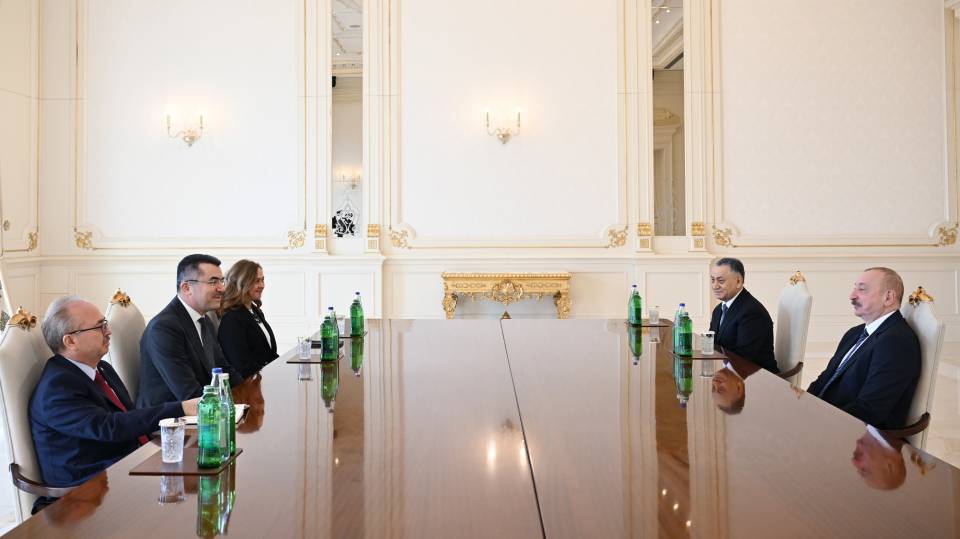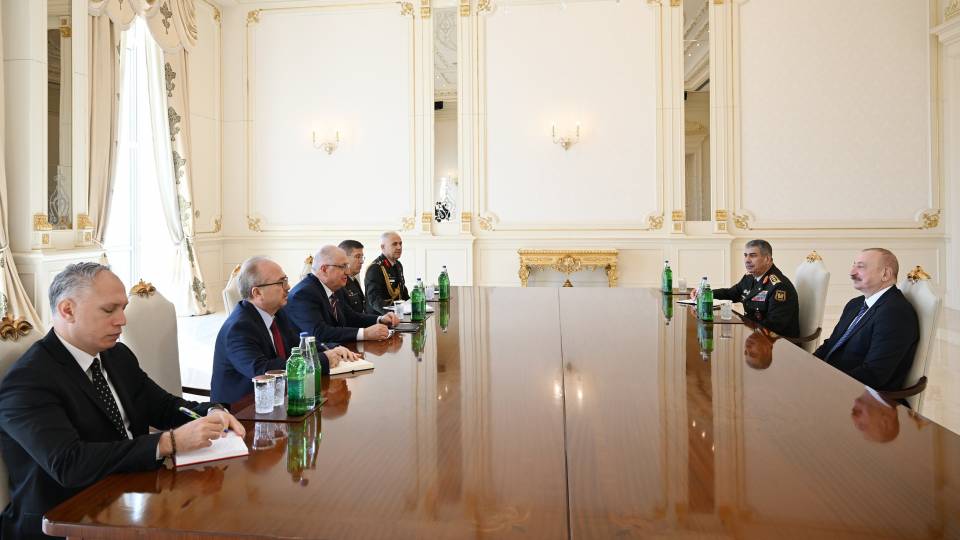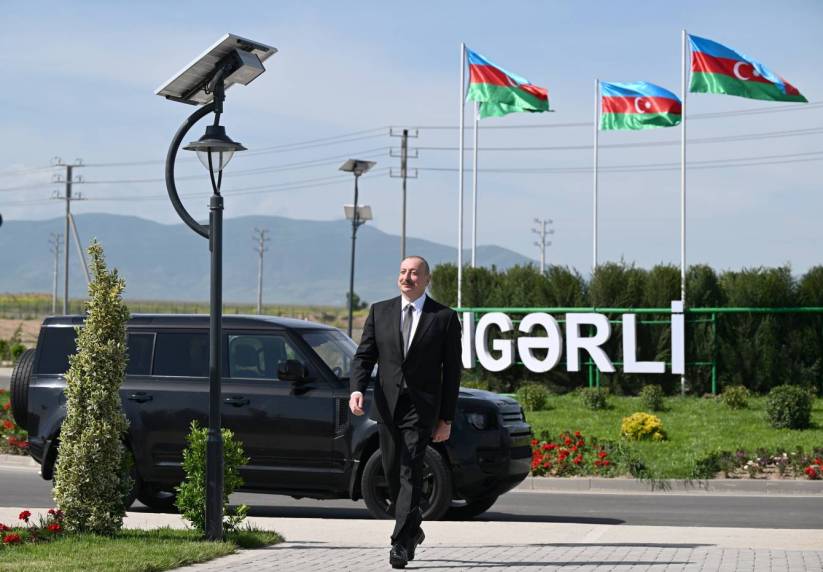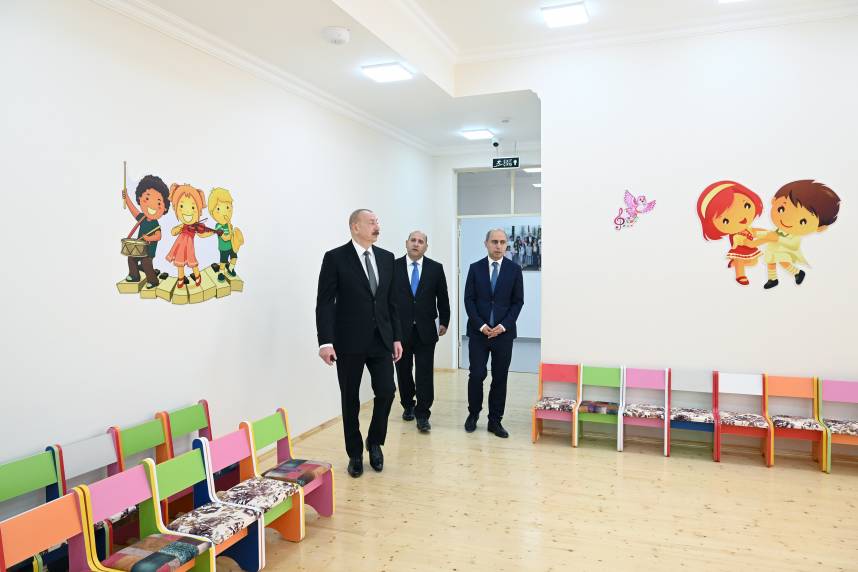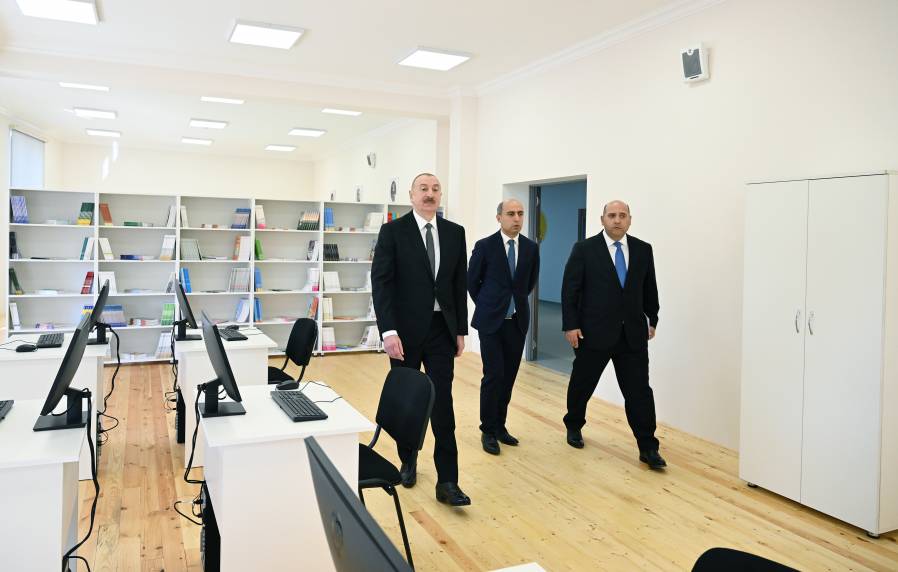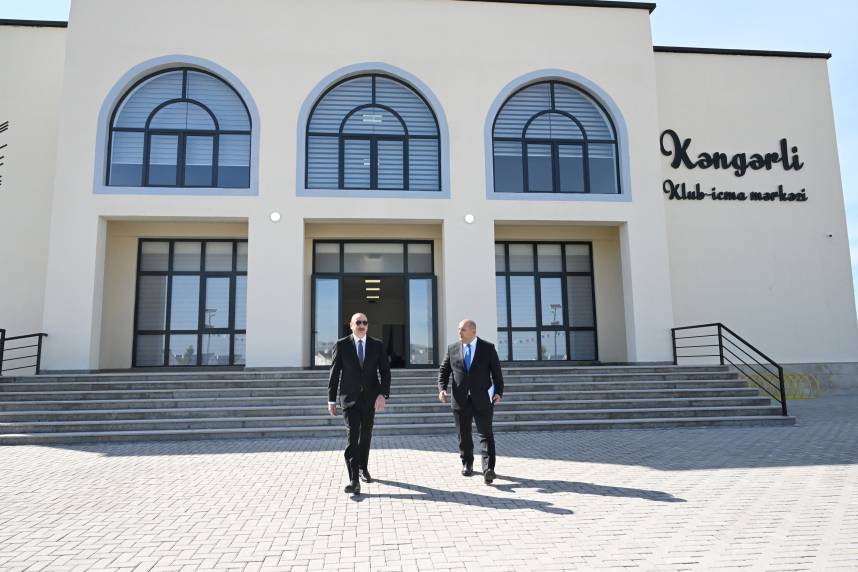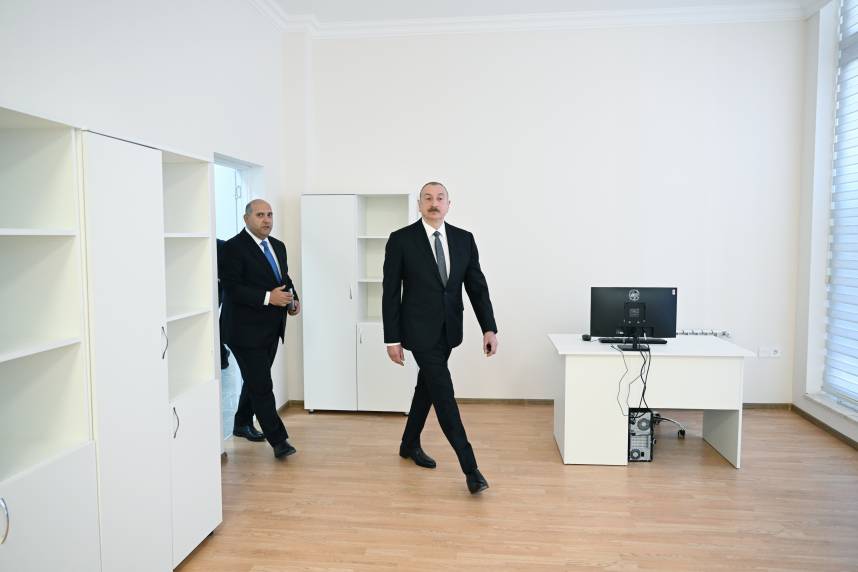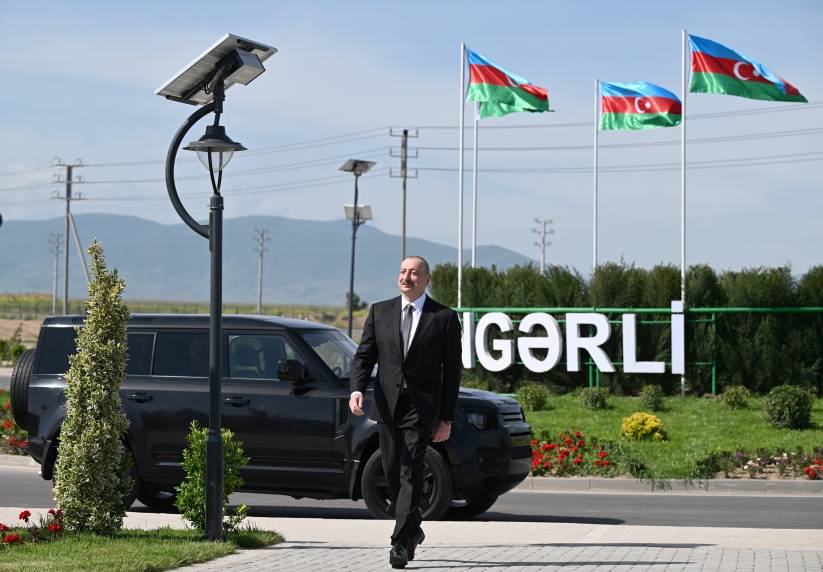14:05
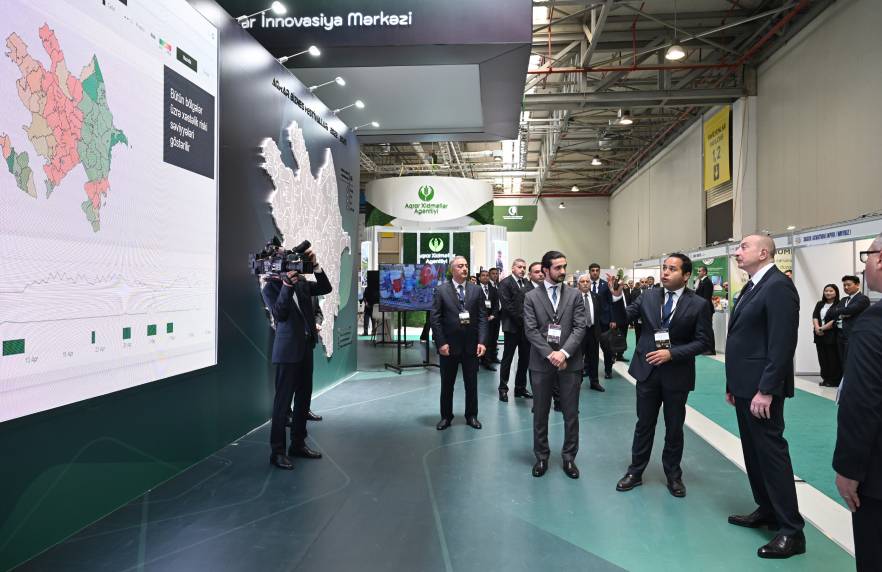
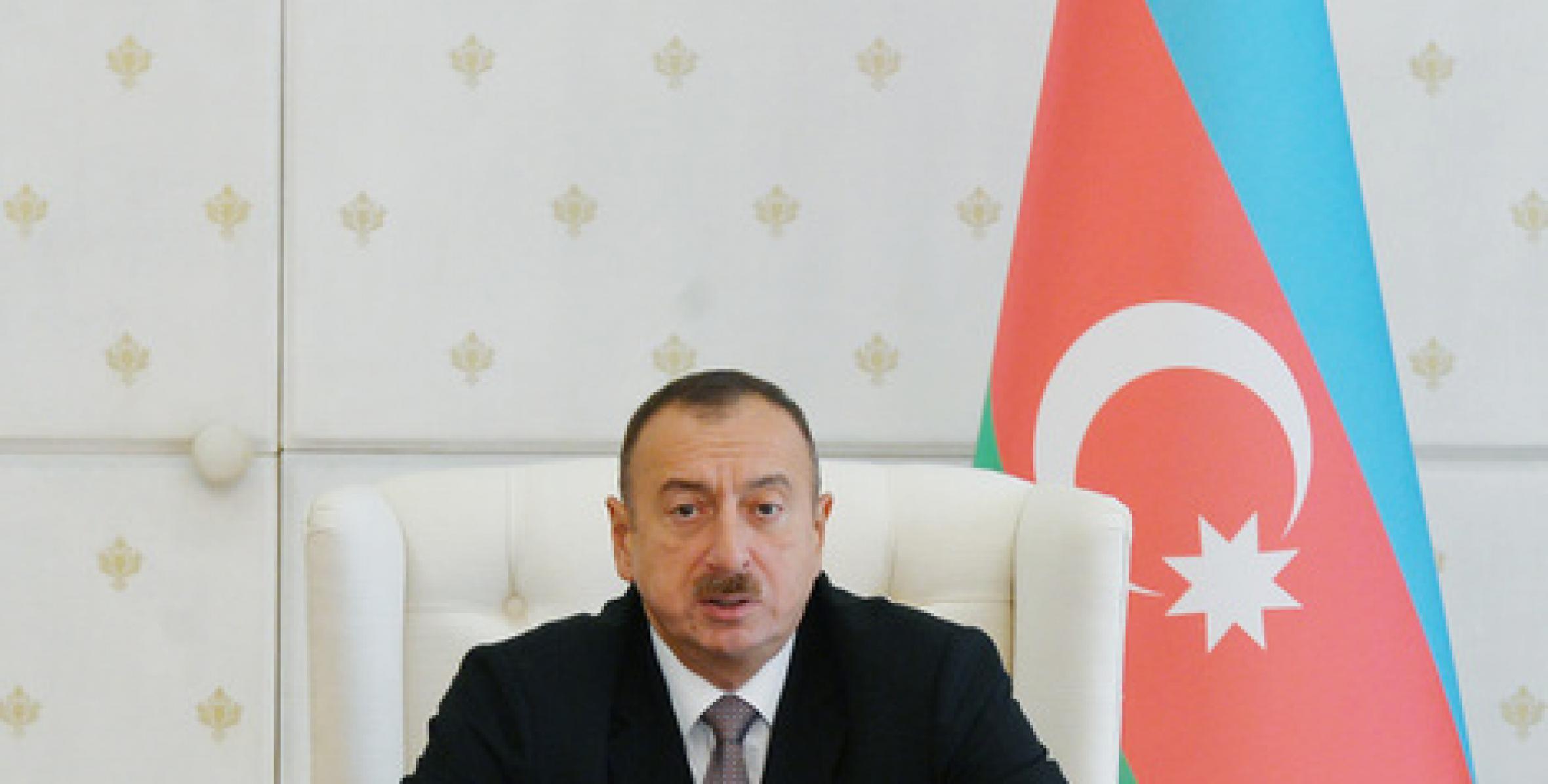
There are two and a half months left for the end of the year. I am confident that all of the work on our agenda will be done by the end of the year and we will end 2015 with good results.
Preservation of macroeconomic stability will remain a priority next year too, because it is a very important area. Macroeconomic stability of any country is the main condition.
Reforms should be deepened. A lot has been done as a result of economic reforms. This is noted by international bodies. The Davos World Economic Forum has again honored Azerbaijan with a high place. Azerbaijan is in 40th place for economic competitiveness. In the CIS, we are still in first place and this, in fact, is a vivid example of the work done. We should try to further deepen the economic reform and take additional measures to liberalize the economy.
We are pleased with a high score of the Fitch rating agency. This is a fair approach. As a result of the work done in Azerbaijan, Fitch has awarded the investment rating of BBB to Azerbaijan in the economic sphere despite the fact that the region is still undergoing a financial and economic crisis. BBB is a very good result, but we must try to achieve even higher ratings. I believe that additional measures to be taken will help us achieve that.
It is necessary to strengthen the financial discipline. We can’t allow waste and unnecessary spending. In some cases, government agencies insistently ask the Finance Ministry for extra funding. This must stop. We are doing everything we have resources for. Everyone, including countries, should live within their means. This policy has saved us from all possible economic risks because if we had spent more than we earned, we would be in dire economic straits now. Therefore, we must stop funding non-priority projects and such instructions have been given. At the same time, sufficient funds will be allocated for all major projects.
It is necessary to review the structure of budgetary spending and spend budget funds economically. In short, we need to ensure full transparency in financial and economic spheres.
Tax and customs authorities should also work transparently and effectively. They can collect more money into the budget. Such capacity and resources are available. Tax and customs bodies have been appropriately instructed to identify these resources next year and collect more funds into the budget. Of course, we need to expand the tax base. We all know that the opportunities are quite broad. Entrepreneurs should pay taxes. Everyone, every entrepreneur has to pay state tax. Unfortunately, the culture of paying tax has not been fully established here yet.
At the same time, you should not lay unreasonable claims on entrepreneurs. In other words, they should not be required to pay bribes and other facilitation payments. In this case, our budget will be increased on the account of the non-oil sector, and this is exactly our goal. I have already tasked relevant bodies. All our current costs should be generated by the non-oil sector, tax and customs. As to the traditional transfers from the State Oil Fund, they should be channeled into investment projects only.
We need to revise the current system of tax benefits and exemptions. We have this experience. We applied it to encourage local production, create new enterprises and install foreign equipment here. I think that these issues should be reconsidered. The development of non-oil exports should be encouraged also through tax mechanisms.
We need to fight corruption and bribery more vigorously. This fight is under way, but I can’t say we have fully achieved our goal. Of course, administrative and punitive measures will be taken. In addition, we should take steps of a systemic nature and conduct institutional reforms. We see very often that administrative measures and penalties do not produce the desired effect, are of temporary nature and the replacement of people proves not as effective at times. It is therefore necessary to continue systemic reforms, make new proposals and, of course, widely apply the experience of “ASAN xidmət”.
The creation of “ASAN xidmət” was a kind of revolution in the field of public services. In a short time, 6 million people have applied to “ASAN xidmət”. The vast majority of people are pleased with its services. There is no corruption, bribery or bureaucracy at “ASAN xidmət”. What does this show? First, it shows that we have a strong political will to combat corruption and bribery. Second, it shows that it is possible to eliminate corruption and bribery. If it is possible at “ASAN xidmət”, then why should it be impossible in other areas? Therefore, every state agency should draw the right conclusions here. The experience of “ASAN xidmət” should be applied everywhere, and the scope of “ASAN xidmət” should be expanded. We have provided “ASAN xidmət” with new functions this year – namely those related to the most corrupt spheres. So I expect new proposals from the government: what services and functions should we provide to “ASAN xidmət”? I want to say again that all other bodies should also apply this experience.
Of course, a lot depends on the people too. I have repeatedly asked our citizens through my speeches to be more active. We need to strengthen public control. Without public scrutiny, we can’t beat corruption and bribery. Therefore, public policy and strong political will already manifest themselves. There are changes for the better. Institutional measures are taken, reforms are carried out and this fight enjoys broad popular support. This support should be even more active.
For a successful and sustainable continuation of our development, the priority is to develop private enterprise. The private sector today is developing, including through the provision of soft loans by the government. These loans are allocated to the real economy. In the future, we need to work harder in this area to maximize business development. Entrepreneurs are provided with political support, guidelines and, of course, material resources to build up their businesses. Currently, key infrastructure projects in the regions are practically over, roads, communications, electricity, gas and water lines are laid. Therefore, there are ample opportunities for business development in the regions and Baku.
We should try to attract foreign investment to the non-oil sector. So far, foreign investors have been showing interest largely in the oil and gas sector. This is natural, because there they get more profits. Our policy, of course, is that foreign investment in the oil and gas sector should be made. If we consider that the Southern Gas Corridor project is currently under way, it certainly requires major funds, but our top priority is to attract foreign investment to the non-oil sector. I think that all agencies should work even harder on this. We need to conduct presentations – of course, business forums are held and we try to motivate foreign investors. At the same time, it is necessary to improve the business environment in Azerbaijan. To do this, we need to take extra measures, and I look forward to receiving the government’s proposals on how we can improve the business landscape.
I should note that international financial institutions and influential international organizations appreciate the reforms carried out in Azerbaijan. This, in fact, is evidenced by the current realities of Azerbaijan. We are developing our economy in such a challenging geopolitical situation – in the conditions of political, financial and economic crisis. But I want our development to be even more rapid and all artificial obstacles hindering our development to be eliminated. Quite often, these artificial obstacles stem from corruption and bribery. Therefore, corruption and bribery are not just a social ulcer and a disease. They are a huge impediment for our economy. Therefore, improved business environment should be seen as a priority issue.
Along with this, there is a great need for improving the system of governance. We need to revise this area. Today, Azerbaijan's economy is developing in a new situation. There was a time when our economic growth was 20-30 per cent annually. Of course, this was due to a sharp increase in oil production and rising oil prices. Those times are over. At present, Azerbaijan's oil production has stabilized, and I am sure it will remain stable for many more years. Of course, today we are working on a major gas project. This, too, will bring us additional revenues. Along with this, I think it is necessary to eliminate the factors hindering out development, in particular, those that create problems in the field of governance. This also requires serious reforms. Some agencies overlap. We shouldn’t allow this. It is necessary to pursue a policy of optimization. This sector should also receive sufficient attention.
Non-oil sector, of course, is the main driving force of our economic development. As I mentioned, about 70 per cent of our gross domestic product is already generated in the non-oil sector. This is an excellent indicator. But it is also true that a different picture is observed in exports, of course. This is perhaps natural because our main exports are oil and gas. In addition, in recent years we have tried to provide the domestic market with local products and reduce dependence on imports. We have practically achieved this. This is why we must try to ensure that non-oil sector goods are competitive. We need to pursue a policy of focusing on exports.
I am sure that very serious steps will be taken to improve the business environment and give an impetus to business development. I must say that there are numerous complaints related to inspections. There are many checks, while inspecting authorities seem to be in competition with each other. This is intolerable. Most of the checks pursue selfish goals. An inspector comes, checks something, overlooks something else, but eventually gets his share and leaves. This is a reality. It is no secret. This must end too. Therefore, I expect to receive detailed information about checks in a short time: what bodies check whom, how many times a year and why. There should be a system. We need to develop a mechanism to regulate inspections. There should be certain conditions – who should inspect whom, when and how long. In general, we need to drastically reduce the number of such checks.
Local executive authorities, including law-enforcement agencies, sometimes create problems for businesses and demand money from them. Entrepreneurs are not indebted to anyone – neither representatives of local executive authorities nor law-enforcement officials. They must only pay state tax and that is all. Entrepreneurs are suppressed, skinned and tortured. This is unbearable. Look – about 30,000 jobs have been closed. We have created 67,000 permanent jobs and closed 30,000. This is what we need to analyze. I need information on the reasons for which these jobs have been closed. It is necessary to invite the leaders of these enterprises and question them. This must end. Of course, there are objective reasons, but there are also subjective ones. People come and put forward unreasonable demands as if someone is indebted to them. No-one is indebted to anyone. Those committing such acts will be severely punished. They should give up these dirty deeds. First of all, this runs counter to our policy. On the other hand, it does not allow our economy to develop fully and entrepreneurs to work quietly in the country.
We have too many licenses. I am told that their number keeps on growing. It should actually grow less, but it is growing. Why? Because relevant bodies are trying to increase their number. What is a license? It is a source of money, a method of illicit enrichment. What is this for? We need to seriously examine this issue. The government should list the licenses being issued and whether they are justified or not. The number of licenses should be sharply reduced. We have chosen a liberal economy model, a market economy, and we are moving along this path. Look at the great success we have achieved. If there were no obstacles in the country, we could have achieved even more. Look how much we could have increased our budget if there was no bribery, corruption, checks, licenses and collection of shares. How long can we tolerate this? Enough is enough. Our patience is over. Let everyone draw the right conclusions. If they don’t, they will be punished.
One of the major problems for the economy is monopolism. Unfortunately, we have not achieved tangible results in this area yet – both in terms of production and imports. I do not know what kind of a psychology it is to believe that if I manufacture a product, no-one else should produce it. One should give an opportunity to someone else, so that there is competition. There will be no development and quality without competition. Let everyone produce. It is true that our market is quite limited, but then you should cultivate and manufacture products to sell abroad. And the state will encourage that. The main area that will ensure future development of our economy will be exports. I have repeatedly spoken about this. We are very seriously preparing for this. It has been mentioned here that we have set up logistical centers abroad. What for? We invest abroad to ensure that our products are delivered there, to new markets. We do this for businesses to have the opportunity to easily sell their products there. But here, if someone produces something, they make it impossible for others to do the same. Or people resort to a variety of ways to attract patrons. This can’t be tolerated. We shouldn’t allow monopolism associated with imports. Let me repeat that we are pursuing a policy towards an open market. This is our policy, our public policy, the policy of the President. Therefore, all structures must pursue this policy, that's all!
This year is a Year of Agriculture. As I have already noted, agricultural production has increased by 6.7 per cent. Agricultural development and growth is both social and economic sphere. We have tried and will continue trying to provide ourselves with basic food commodities by 100 per cent. We are approaching this goal. It has been mentioned here that 30 large farms have been set up, 40,000 hectares of new acreage has been put into circulation. Large grain farms harvest 50-60 quintals of crops per hectare. This is a very high figure considering the fact that our average yield was 25-26 quintals until recently. This year, the average yield is above 30 quintals. This is a record figure. Therefore, further measures will be taken to address the issue of food security. We will put new acreage into circulation. By commissioning of two large water reservoirs – Takhtakorpu and Shamkirchay, we plan to irrigate thousands of hectares of land. The Ministry of Economy and Industry is working to prepare a business plan. Private entities should also take interest. The new acreage will be used to grow crops, much of which will be exported.
Azerbaijan is successfully pursuing a policy of industrialization. As I said, non-oil industry in Azerbaijan has increased by 10.2 per cent. Industrial estates are being established. This is also proving effective. The Sumgayit Chemical Industry Park is expected to attract investments of $1 billion. Work has already begun. We need to create special industrial zones in all our districts. A pilot project is already being implemented, and I am sure it will be successful.
There are plans to continue infrastructure projects. Projects of rural roads, gasification and drinking water – these processes are already widespread in all our districts. We expect to launch a new treatment plant at the Jeyranbatan water reservoir. This is a very large project. Several years ago, I attended a groundbreaking ceremony for this project. Today, this project is almost ready. This project will play a key part in providing Baku with clean drinking water. At the same time, we must continue creating a social infrastructure. Schools, hospitals, kindergartens – all of this is always in the spotlight. We need to incorporate these projects in the public investment program for next year.
A serious turnaround has been created in the pharmaceuticals market. The government has already taken this area under its own control. In previous years, it was largely perceived as a business area – i.e. there was a market, demand and supply. The market regulates everything. But when we began to deal with this issue more closely, we saw huge violations there.
The prices of some drugs were inflated several times. We were not very pleased with their quality either. We are now introducing a new mechanism of state regulation. Starting from 15 September, people have had the chance to feet it. Until the end of the year, most of the drugs will be sold at new prices. Great attention is also being paid to the quality of medicines. The prices of medicines are falling and will continue to fall. This, in the first place, is a serious social step. On the other hand, work in this area was built incorrectly. There are many spheres like that. It is therefore necessary to analyze every area. Wherever there are shortcomings and drawbacks, they must be eliminated. As for the market of medicines, we can say that we worked hard for about a year, some analysis was made and there are already great results. The people are happy. The government has taken this area under its own control now. I am sure that the tax obtained from imported drugs and the money in the form of customs duties will be increased now. In other words, our budget will benefit from this.
In my opening remarks, I noted that the transport sector was very important for our future development. The North-South and East-West transport corridors must pass through the territory of Azerbaijan. Today, cargo is transported through Azerbaijan, but in some cases the volume of cargo has reduced. There are objective reasons for that. We should acknowledge that. The world is in crisis and economic activity both in Asia and in Europe has significantly decreased. Asia and Europe trade through our territory. So there are both objective and subjective reasons.
In recent years, we tried to create a transport and logistical center in Azerbaijan, and have been able to achieve this to a large extent. We have purchased new vessels, ferries, tankers, bulk carriers and new cargo aircraft. We have built several international airports in Azerbaijan. Steps are being taken to develop the railway. We have built highways linking us with neighboring countries. Unfortunately, these projects are not yet fully completed, but most of them have been implemented. We are building a new international trade seaport, which will be the largest trading port in the Caspian basin. This work is carried out with public funds. No private funds have been invested. In some cases, loans have been provided, but these are being repaid by the state. This is the policy pursued by the government. Along with this, there should be coordination as well, because the North-South corridor will bring us huge revenues. This route passes through Azerbaijan and will attract millions of additional cargo to our territory. This will bring both political and economic dividends.
Unfortunately, the construction of the Baku-Tbilisi-Kars railway has not been completed yet even through it has been eight years since the project was launched. In 2007, we, the three countries involved, launched this project. As I said, the issues under the responsibility of Azerbaijan have already been resolved. The rest of the work on the territory of Turkey will also be done. We need to put this railway into operation as soon as possible because countries and companies are in competition for cargo. We are sitting here and waiting for something to happen. We are waiting for someone to come and ask us. And when they do, we put forward such conditions that the requester walks away. This is intolerable. This issue must be seriously analyzed, and we must apply a unified tariff policy. The Caspian Shipping Company, the railway and the port – each of them has its own corporate interests. But are they consistent with the interests of the country? No, they are not! The interests of the state are to create a corridor for the sender of goods not to have a headache or have to apply for 10 and 20 people, but resolve the issue by e-mail, in a modern fashion. This is only a part of the issue. We must create this, and relevant instructions have already been issued. There must be serious coordination here. In the near future, I expect to receive specific proposals. Another issue is that we need to attract these cargoes. We should offer to transport them through the territory of Azerbaijan. So these two factors are very important. I am sure that the tasks I have set here will be resolved soon.
We have recently taken serious steps related to municipal transport. A new company has been set up. The buses of “BakuBus” are of the highest level. Perhaps these are the most beautiful and modern buses in the world. We have done this for our people to enjoy public transport. I believe that the scope of “BakuBus” should be expanded, because in comparison with other services, people, of course, prefer “BakuBus”. Therefore, I believe that the state budget for next year should envisage funds for the purchase of more buses. By purchasing additional buses every year, we can further expand the activities of “BakuBus”.
The construction of the underground is under way. I am sure that next year we will celebrate the opening of some new stations. We have launched the Baku-Sumgayit train service. These are modern trains. A new railway track has been laid. All this is done for people’s comfort.
After the first European Games, the interest in Azerbaijan has been increasing. I am sure that this will manifest itself in the tourism sector too. It is also necessary to pursue a policy of attracting tourists. Here too, we have to be more active. The first European Games have somewhat presented our country to the world. We have shown Azerbaijan to Europe and the whole world as a modern, beautiful and developing country. We have shown Baku as one of the most beautiful cities in the world. The interest in us, of course, is on the increase. Next year's Formula 1 competition is, perhaps, the first or second competition in the world is terms of its proportions. It will attract additional attention. These are excellent opportunities for attracting foreign tourists to Azerbaijan. This process is under way, but it can go even faster.
Finally, next year we need to do very serious work to create the Southern Gas Corridor. Construction work is already beginning. This also requires coordination. All agencies should work so that there are no delays at all. The Southern Gas Corridor is a large multinational project being implemented on Azerbaijan's initiative and with the active participation of neighboring countries. This project will provide long-term interests of Azerbaijan, ensure our political, economic and energy interests and turn Azerbaijan into an even more important country for the world. I am very pleased that all members of the Southern Gas Corridor, all countries involved take a common position here. As you know, the first Advisory Council meeting of the Southern Gas Corridor was held in Baku on the initiative of Azerbaijan in February this year. The Declaration adopted by the Council reaffirms the leading role of Azerbaijan. This is a great honor and huge responsibility. All projects implemented on our initiative to date have been successful. I am confident that the Southern Gas Corridor will also be another victory for Azerbaijan. Thank you.

